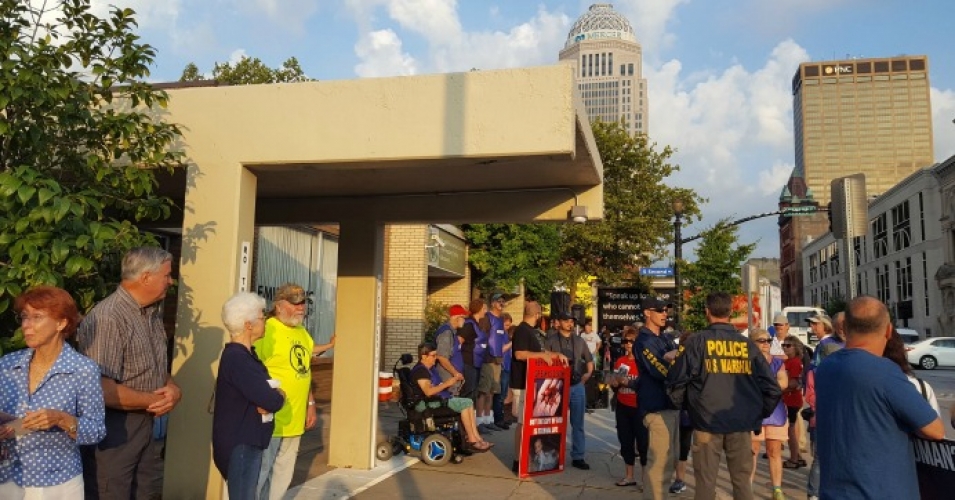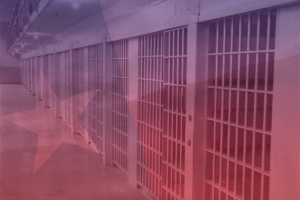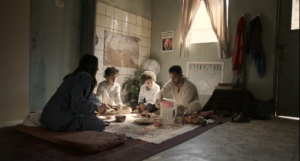Nationwide Offensive Devastates Independent Abortion Clinics
A new report from the Abortion Care Network details an alarming rate of closures in several states. In response to steps taken by anti-abortion activists, abortion rights advocates gather outside an independent clinic in Louisville, Ky., in July. (Image courtesy of @NatAbortionFed/Twitter)
In response to steps taken by anti-abortion activists, abortion rights advocates gather outside an independent clinic in Louisville, Ky., in July. (Image courtesy of @NatAbortionFed/Twitter)
A new report by the Abortion Care Network shows that in the past five years, almost one-third of independent abortion clinics have been forced to close.
Independent clinics traditionally provide the majority of U.S. abortion care. “Anti-abortion politicians and extremists are forcing these clinics to close at an alarming rate,” said Nikki Madsen, executive director of the Abortion Care Network.
Rewire writes about the report:
The 12-page report paints a bleak picture of the state of abortion access at the nation’s remaining independent clinics. Fifty-six clinics have closed in the past two years, and 145 have shut down since 2012, leaving 365 left in the United States. Texas, a state leading the nation in harsh anti-abortion restrictions, saw the most independent clinics close: 20. But progressive states like California also had a high number of closures—15 between 2012 and this year.
Today, Kentucky and four other states—Mississippi, North Dakota, West Virginia, and Wyoming—are down to a single independent abortion clinic. In Arkansas, Oklahoma, Georgia, and Nevada, independent clinics are the sole providers of surgical abortions after 10 weeks. Without these clinics, the report suggests, the only option for pregnant people would be a medication abortion. Independent clinics are also more likely to offer abortion at every stage of pregnancy.
For women in need of safe abortion care, the closure of these clinics is disastrous. “Meaningful access would absolutely not be available without these clinics,” Madsen told Bustle. “Independent abortion care providers make the right to abortion a reality, they provide the most abortions in the U.S., and in several states are the only place a woman can go to end her pregnancy. The way that these restrictions are coming out are specifically with the goal to close clinics, and they have nothing to do with women’s healthcare or the wellbeing of women.”
Women often prefer independent abortion clinics over other venues such as hospitals because the clinics charge less. The economic accessibility of these clinics matters: Those hit hardest by the closures come from economically marginalized communities and are more likely to be people of color. Nearly half the women who seek abortions live below the poverty line. Colorlines writes:
Because they are independent and often for-profit, it’s hard to pinpoint the demographics of the women who go to independent abortion providers. So while we know that, according to 2013 data, 14 percent of Planned Parenthood patients are black, 22 percent are Latina and most are on Medicaid, independent providers can choose whether or not to collect race data about their patients. Women of color, particularly blacks and Latinas, have the majority of abortions in this country, and are therefore likely to be using an independent provider.
Independent clinics are also more likely to provide broader women’s health services—the majority of clinics providing abortions after the first trimester are independent. The Abortion Care Network report estimates that without these independent providers, access to abortion after 16 weeks would decline by 76 percent, and access after 19 weeks would be virtually nonexistent.
While Planned Parenthood is an easy target for anti-abortion activists, it also has more visibility and resources to fight back against TRAP laws aimed at making safe abortion harder for women to acquire. Smaller independent clinics often lack the funds to fight, making them easier targets for shutdowns.
In past months, events in Kentucky have highlighted the nationwide offensive against independent abortion clinics. Anti-abortion activists went to extreme measures to attack the state’s last remaining abortion clinic, harassing patients and providers and projecting an abortion procedure on a 12-by-18-foot screen.
The Kentucky legislature is under Republican control, and Republican Gov. Matt Bevin has been vocally anti-choice. Since Bevin’s election in 2015, the state has passed measures making it more difficult to get an abortion, banning the procedure after 20 weeks of pregnancy and requiring that doctors “narrate ultrasounds in detail,” even to patients who object. The ACLU has filed a challenge to the ultrasound measure, and the case is scheduled for September.
As more clinics close throughout the country, the “healthy ecosystem of abortion care” will be jeopardized, Madsen said. “Abortion care cannot become a monopoly” of clinics that survive.
Your support matters…Independent journalism is under threat and overshadowed by heavily funded mainstream media.
You can help level the playing field. Become a member.
Your tax-deductible contribution keeps us digging beneath the headlines to give you thought-provoking, investigative reporting and analysis that unearths what's really happening- without compromise.
Give today to support our courageous, independent journalists.






You need to be a supporter to comment.
There are currently no responses to this article.
Be the first to respond.